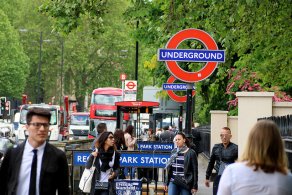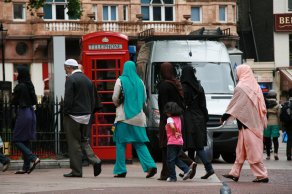
London park. Photo: Daniel Enchev, via Flickr
Who is the ‘we’ in the context of the Brexit vote?
Whilst the protection of British borders was a key ingredient in Brexit debates, the answer to what kind of a community we are talking about within those borders, remains in desperate need of addressing. Lingering notions of cultural purity cannot stand unchallenged.
Which community, which sense of ‘we’, was the subject of the battle in Brexit? Brexit was won on immigration, or more accurately on ‘the topic of immigration’. Arguably, it was won on the basis of a particular conception of ‘us’ set up against a variety of ‘thems’, as an external defining agent, rather than on an internally driven grounded sense of a ‘we’. The Brexit ‘thems’ notably included EU immigrants. For Brits, as people across Europe, have radically different perceptions of the scales of immigration and cultural diversity, than what actual numbers tell.
Yet, it was easier to put the blame on someone, in this case predominantly on EU immigrants, for the very real challenges of rising economic and social inequalities in the UK, than it has been for politicians to take responsibility for these problems through, for example, fairer distribution of resources over the past decades.

Photo: Sérgio Ereira via Flickr
The Brexit vote was also clearly divided in economic terms: ‘If you ‘ve got money you vote in,…, if you don’t you vote out’. And a perhaps even more clear and profound divide was the generational one, with 75% of 18-24 voting remain, and 56% of 25-49 year olds the same, with older voters, that is those 50 and above, tipping the balance in favour of the Leave vote.
Whatever position on the outcome, and whatever efforts to continue a political process within democratic means to overturn the Brexit vote, the UK as a divided society comes across more than anything else. This divided, polarized even, reality, is not one unique to the UK. There are scalar mismatches; there are problems of democratic legitimacy, and of simply differing experiences based on contrasting life-worlds. Those have to do with social and economic inequality, where British trade unions notably spoke clearly up for a Remain vote, but they have also to do with different perceptions and experiences of immigration and diversity.
Honing in on notions of cultural purity in parts of the Brexit campaign necessitates some uncomfortable questions. That it was UKIP supporters who were most clearly in favour of Brexit was a given. For Brexit confirms British governments’ inability to address social inequality over time, and was thus clearly a protest vote against the establishment, and in more general terms also of implications of globalisation. Sadly, however, neither the Leave nor the Remain campaigns managed to provide answers to solving social problems and challenges of growing inequality, whilst this is what most closely affects people, no matter who they are.
So how can we then understand that non-white Brits in poor areas of south-east London voted Remain to a far greater extent than white Brits in east London with similar levels of income and education? These statistics are available on the BBC’s website, and should provoke reflections on the roles not only of the issues of EU immigration and border controls more generally, but more profoundly about what kind of ‘us’, was underlying the Leave-campaign’s logic. For it was rather an ‘us’, arguably; than a ‘we’. This is a reflection, however, which is equally relevant to other European countries, where implicit uses of exclusionary conceptions of a white ‘us’, need to be stood up against in unequivocal terms.

New Londoners. Photo: Ramiro Sánchez-Crespo via Flickr
But the Brexit Leave campaign, unlike anti-immigrant sentiment in most parts of the remainder of Europe, was actually centred clearly on EU immigrants. For what was it that caused London’s mayor, Sadiq Khan, to speak in particular to EU immigrants and ask them not to believe that they are not wanted? The British people are divided, and Europeans in the UK feel that they have been voted out. Meanwhile, however, Khan asks them to believe that their children are still the children of London.
In the UK, many people have in the past week been asked to go “home”. Flyers have been left outside schools demanding ‘No more Polish vermin’. No, this is not representative. But people who until Friday 24 June were a part of British society experience this change unambiguously.
For where should a woman, whose Jewish family migrated long ago from Eastern Europe, go? Where should a Welsh-born Muslim go? Are they not part of this society; of the ‘we’ that provides a secure existence within a society? If not, is this because of religion, skin colour, or what?
Modern-day European societies are plural; indeed they have to some extent been plural historically too. And so our history in Europe is the history of all today’s Europeans, although we may look at it differently. At times, we do perhaps need to ask who ‘we’ are. But our understanding of who ‘we’ are needs to be open, because reality does not reflect singular readings of history, nor of the present day, in terms of a culturally pure ‘us’.
A focus on the post-Brexit ‘we’ is neither a purely academic one, nor is it the outcome of political correctness; for when white people in east London to a higher extent than non-whites in similar socio-economic conditions in south London vote Leave, the question of immigration, of cultural difference, is not irrelevant. This does not make voting Leave a racist act, of course. But reflections on the possible answers to this difference in voting are uncomfortable, and point to the fact that some feel that their right to belong, their taken-for-granted place within the ‘us’ rather than the ‘we’ which Brexit battled over, is precarious, or at the very least in question.
The fact that some Leave voters were also non-white, for instance in cities like Birmingham, underlines the complexity, where immigration, anti-immigration rhetoric sometimes overtly racist, was part of, but not the whole story. For British society is made up of many Leave and many Remain voters who are non-whites, and who are British citizens and the descendants of one or several generations of British citizens. The EU immigration issue, however, in its presentation by the Leave campaign as closely connected with the prevailing lack of new jobs in post-industrial areas of the North, can be seen to have contributed to a ‘pulling the ladder up’ effect, rather than one of solidarity among those with a previous history of immigration in their families.
Meanwhile, events in the UK since the Brexit vote underline the role which immigration played. And racism even. ‘I’ve just been verbally abused – tell me again how racism played no part in Brexit’ writes Natalie Pitimson, having experienced verbal, and overtly racist, abuse on a British train, without any of the other passengers reacting. Her fear is that now many people will ‘have to fight just to be seen as human’, as the objectifying logic of de-humanizing fellow human beings has somehow become legitimized, even in the public sphere.
Ignoring that ‘the campaign was fuelled by a white resentful nationalism’ is dangerous. For, as Gavin Titley points out, this is not a British phenomenon, rather it is a European one: ‘the fantasy communalism of resentful nationalism and cultural purity as a solution to the economic inequality and social dislocation’ of our times, is one which far-right populist, largely anti-EU, parties across Europe are proposing disenchanted voters. The psychology of fear, where immigrants are feared, and therefore dehumanized, lies at the core of the success of such movements, where the role of facts in saying something about the economic impacts of immigration for instance, is rarely relevant.
Meanwhile, the UK, as every other democratic country, requires a shared sense of community, which together shares some level of trust in a legitimate government, albeit where there is political disagreement. However, such a democratic and plural society cannot question the legitimate belonging of its members, of its citizens for sure, whereby some are automatically entitled to belong, while others’ belonging remains precarious, questioned and conditional.
Therefore, the Brexit campaign and result in its articulations of dividing lines within the UK should be a reminder of the challenges of inequality especially, which cannot remain unaddressed, and for which British policies, or rather lack thereof perhaps, can be blamed. These can, and should, be adequately addressed. Meanwhile, the artificially construed divisions between human beings, where the dehumanizing of some becomes legitimate, whether or not this is explicitly acknowledged, is an underlying threat not just in the UK. This is a threat where responsibilities for taking a stand against slippage to fear-mongering, toward dehumanizing, are inherently shared. In the UK the challenge of showing racism the red card is being taken up – will that also spread to other parts of Europe, and will it be enough?
Marta Bivand Erdal is a Migration Researcher at PRIO. She works among other on projects researching living together in diverse European societies, NATION, GOVCIT and ACT. This blog post reflects those research interests, and in the post-Brexit context is also the result of her personal reflections, as a British citizen, born in Poland, and living in Norway.